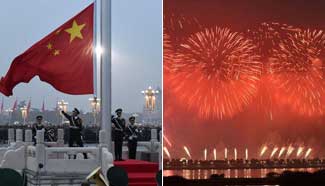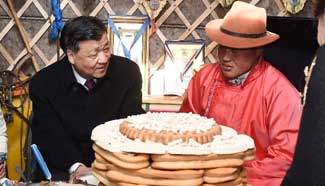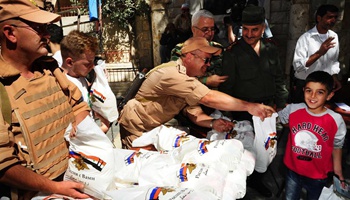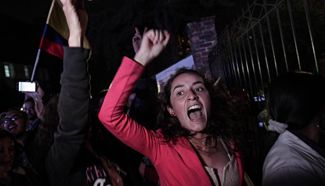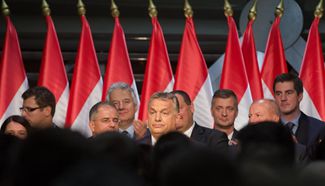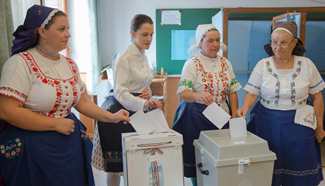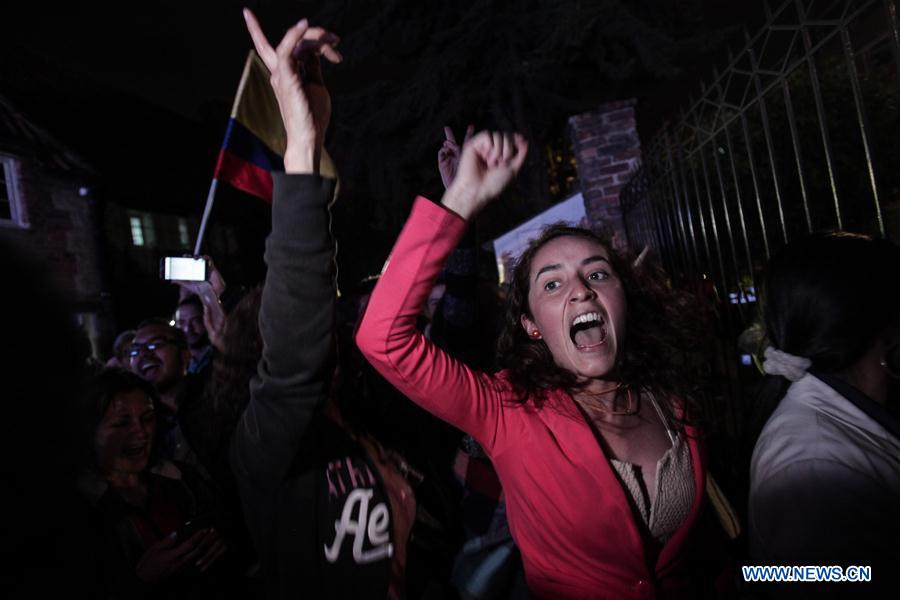
Residents react during the ballot count for the peace agreement signed by the Colombian government and the Armed Revolutionary Forces of Colombia (FARC), in Bogota, capital of Colombia, on Oct. 2, 2016. Colombian President Juan Manuel Santos on Sunday acknowledged that voters had rejected a peace agreement between the government and the Revolutionary Armed Forces of Colombia (FARC), insisting that the ceasefire still exists. (Xinhua/Jhon Paz)
BOGOTA, Oct. 2 (Xinhua) -- The future of the peace process in Colombia is now uncertain as the No camp took a razor-thin lead Sunday in a national vote on whether to accept the agreement between the government and the Revolutionary Armed Forces of Colombia (FARC).
Weeks of polling had shown the Yes camp would win by an almost two-to-one margin. But with almost all the votes counted, 50.2 percent of Colombians who voted Sunday opposed the deal and 49.8 percent favored it, according to the National Civil Registry's website.
In their immediate reactions to the result, President Juan Manuel Santos and the FARC promised that the ceasefire would remain in place.
"I am the first to recognize this result with one half of the country saying Yes and the other half of the country saying No," Santos said in a televised address, while pledging that "the bilateral and definitive ceasefire and end of hostilities remain in place and will remain in place."
He also promised to respect both views expressed in the vote and called for a dialogue between those who oppose the peace agreement and those who support it.
"Tomorrow, I will call all political forces, especially those who campaigned for No, to listen to them and open spaces of dialogue to determine the path to follow. We will decide between us which path to take in order to make peace possible," Santos said.
Speaking from Havana, Cuba, where the peace talks were held for four years, FARC leader Timoleon Jimenez said that today's results are a victory for those who have always bet on war and bloodshed in Colombia.
"The FARC deeply regrets that the destructive power of those who spread hate and bitterness has influenced the opinion of the Colombian people," Jimenez said.
However, he said that the desire of the FARC to become a political movement "demands we be stronger in building stable and lasting peace. The FARC maintains their desire for peace and reiterates their desire to only use words as a weapon to build the future. To the Colombian people who dream of peace and who count on us: peace will win."
Despite this attempted show of unity, the result shows that Colombia is a bitterly divided country. Some of the areas most affected by the conflict voted in support of the deal, such as the department of Cauca, where 67.38 percent backed the agreement. Despite this, two major cities, Medellin and Bucaramanga, saw a major swing toward the No camp, which proved crucial to the result.
The low turnout of just 37.4 percent may have been due to Hurricane Matthew, which dumped heavy rain on Colombia's Caribbean regions.
There were calls to extend polling hours but the government refused.
The result is a major victory for former President Alvaro Uribe, who led an active No campaign. The No campaign held that the offers of impunity to FARC members were too broad and that they should be punished for their crimes.
The result also shows that jubilation for the peace agreement was premature. On Sept. 26, Santos and Jimenez signed the peace agreement in Cartagena, Colombia, dressed in white to symbolize the end of the conflict, which was hailed by the international community.
The agreement contained several contentious issues.
The most difficult for some Colombians to swallow was that guerrillas coming forward and confessing to their crimes would avoid prison sentences, only facing restrictions on their liberty for up to eight years.
Another was that the FARC's new political party would be granted five seats in the House of Representatives and five in the Senate.
Uribe pledged that, should the deal be rejected, Colombia would be able to renegotiate the agreement but the FARC has given no assurances that they would be prepared to do so.
The FARC approved the peace deal at a major national conference in September, vowing that they would lay down their arms and fight for the future of Colombia within a democratic framework. What this decision means for their demobilization process is now one of the major questions facing the country.
The FARC has honored a nationwide ceasefire since July 2015 and some analysts feel that their movement toward becoming a political party is now irreversible.
However, the fear of facing prosecution or of resentment at the failed vote may lead some of its troops to refuse transition or, worse, continue the fight.
In September, Humberto de la Calle, Colombia's chief negotiator with the FARC, said that "renegotiating would be a historic error. It would be a national disaster if we create the illusion that we could negotiate better conditions."
With less than two years to go until the 2018 presidential elections, it would seem difficult for the Santos government to return to the negotiating table and crank out a new deal in time. This leaves Colombia prey to a difficult situation: uncertainty.
With the campaign over and a decision taken, all political forces in Colombia, including the FARC, will have to work harder than ever to bring about lasting peace.
The conflict between the Colombian government and the FARC started in the 1960s as an uprising over land rights.
Data from Colombia's National Center for Historical Memory showed the 52-year-long civil war has left 220,000 people dead, 25,000 missing and more than 5.7 million homeless in the country.
A survey by a peace and development research institute estimated the economic loss had reached 179 billion U.S. dollars.




